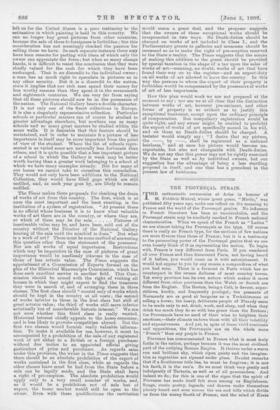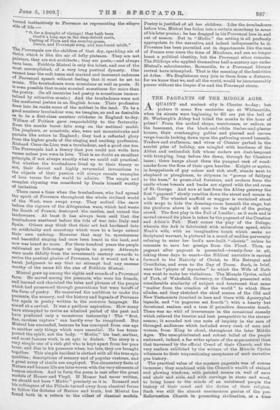THE PROVENcA.L STRAIN. T HE enthusiastic ceremonies at Arles in honour
of M. Frederic Mistral, whose great poem, " was published fifty years ago, make one reflect on the meaning to France and the world of the Provençal genius. No influence in French literature has been so unmistakable, and the Provencal strain may be similarly marked in French national characteristics. When we speak of the French as " Latins " we are almost taking the Provengals as the type. Of course there is really no French type, for the sections of few nations are more diverse than those of France; but it is a testimony to the permeating power of the Provencal genius that we can even loosely think of it as representing the nation. To begin with, France is very different from Paris. If you wandered all over France and then discovered Paris, not having heard of it before, you would come on it with astonishment. It would not appear to you by any means a compendium of what you had seen. There is a ferment in Paris which has no counterpart in the serene dullness of most country towns. Yet every province has its own nature which makes it more different from other provinces than the Welsh or Scotch are from the English. The Breton, being a Celt, is devout, super- stitious, kindly, and frequently prodigal; the peasants of Normandy are as good at bargains as a Yorkshireman at selling a horse ; the heavy, deliberate people of Picardy seem to be made only to eat, drink, work, and sleep, and when they drink too much they do so with less grace than the Bretons; the Provencals have no need of their wine to heighten their emotions,—their climate endows them with all their volatility and expansiveness. And yet, in spite of these vivid contrasts and oppositions, the Provencals are on the whole more "French" than any people in France.
Provence has communicated to France what is most truly Latin in the nation, perhaps because it was the most civilised part of the outlying Roman Empire. It thrives under a warm sun and brilliant sky, which ripen gaiety and the imagina- tion as vegetables are ripened under glue. Daudet remarks that if a Southerner tells lies, he must be forgiven; it is not his fault, it is the sun's. So we must think very gently and indulgently of Tar tarin, as well as of all gasoonaders. And indeed we do; for this is one of the signs that the spirit of Provence has made itself felt even among us Englishmen. Songs, rustic poetry, legends, and dances make themselves plainly heard and seen across the sea and bills which divide us from the sunny South of France; and the mind of Keats
turned instinctively to Provence as representing the allegro side of life "0, for a draught of vintage! that bath been Cool'd a long age in the deep-delved earth, Tasting of Flora and the country-green, Dance, and Provençal song, and sun-burnt mirth."
The Provençal, are the children of that dry, sparkling air of theira which is like the air of lofty plateaus. They are not Painters, they are not architects ; they are poets,—and always have been. Frederic Mistral is only the latest, and one of the most accomplished, of a very long poetical dynasty. One cannot hear the soft tones and marked and incessant cadences of Provençal speech without feeling that it must be set to umiak. The troubadours were musicians as well as poets. It is even possible that music counted sometimes for more than the poetry. (In all countries bad poetry is sometimes immor- talised by attractive music.) And the troubadours were not like mediaeval jesters in an English house. Their profession drew into its ranks some of the noblest in the land. To be a good amateur troubadour was, we imagine, an end as desirable an to be a first-class amateur cricketer in England to-day. William of Poitiers gave respectability to the fraternity. Even the monks burst into song on the national model. The jongleure, or minstrels, also, were not mountebanks and Pariahs like actors in England ; they had a reflected glory from the higher grade of the singing and reciting profession. Richard Coeur-de-Lion was a troubadour, and a good one too. The Provençal. had a theory that you could not write love verses unless you were in love. That is no doubt an excellent Principle, if not always exactly what we could call practical. But whether the troubadours lived up to their theory or not, their devout and highly reverential invocations to the objects of their passion will always remain examples of love verses for the world to admire. The ample and complex rhyming was considered by Dante himself worthy of imitation.
• There came a time when the troubadours, who had spread the spirit of Provence throughout the whole civilised world of the West, were swept away. They melted like snow before the rigours of the Albigensian wars, which laid waste the South of France, destroyed the castles, and ruined the landowners. At least it has always been said that the troubadours scattered before the tide of war into Italy and Spain. Others may think that their art had hardened into an artificiality and monotony which were to a large extent their own undoing. However that may be, spontaneous and beautiful singing had once been heard in the land, and now was heard no more. For three hundred years the people cultivated no folk-songs or legends in poetry. Attempts were made fitfully from the seventeenth century onwards to revive the poetical glories of Provence, but it would not be a harsh judgment to say that no attempt had any success worthy of the name till the rise of FAderic Mistral.
Mistral grew up among the sights and sounds of &Provençal farm. He moved among the peasants, who were his friends, and learned and cherished the tales and phrases of the people Which had persevered through generations but were bereft of the form of poetry. He conceived the ambition to make the Peasants, the scenery, and the history and legends of Provence live again in poetry written in the common language. He aimed at a revival. It was a perilous aspiration. How many have attempted to revive an admired period of the past and have produced only a monstrous insincerity 1 The "first, Sue, careless rapture" can hardly ever be recaptured. But Mistral has succeeded, because he has conveyed from one age to another only things which were essential. He has trans- ported the spirit, not the body. " Mireio," his best, earliest, and most famous work, is an epic in dialect. The story is a • very simple one of a rich girl who is kept apart from her poor lover, and dies in his presence when, too late, they are brought together. This simple incident is clothed with all the true epic qualities ; descriptions of scenery and of popular customs, and a great array of simile are employed. The elementary facts of Nature and human life are interwoven with the very elements of
hum an emotion. And in form the poem is oast after the great
models of Homer and Virgil. If Homer had never written, we should not have " Mireio " precisely as it is. Roneard and Ins colleagues of the Pleiade turned away from classical forms to follow the dictates of Nature and truth, but Mistral has found both in a return to the oldest of classical models. Poetry is justified of all her children. Like the troubadours before him, Mistral has fallen into a certain monotony in some of his later poems; he has dragged in his Provençal lore in and out of season. But in " Mireio" the setting is all perfectly appropriate to the narrative, and indeed indispensable to it. Provence has been parcelled out in departments like the rest of France ever since the time of Mirabeau, and can no longer boast a political identity, but the Provençal ethos remains. The Faibrige who applied themselves half-a-century ago under Mistral's schoolmaster, Romanille, to a Provençal literary revival have triumphed. That is the meaning of the festivities at Arles. We Englishmen may join in them from a distance, for we know that we, and all the world, would be immeasurably poorer withoutthe langue croc and the Provençal strain.











































 Previous page
Previous page